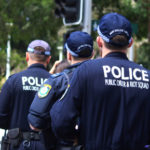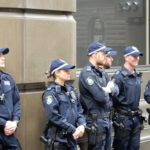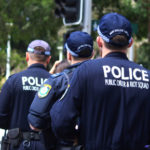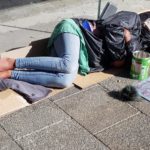COVID Policing in Australia: An Interview With Liberty Victoria’s Michael Stanton

As the majority of Australians sit at home during the lockdown, we’re keenly aware that the reason we are isolating is to halt the spread of COVID-19. And as a nation, we’ve been very compliant. Indeed, some might say, this has been regardless of the new penalties that apply.
Following a 29 March announcement from the PM, police forces across the country have been gifted with expanded powers to enforce two prohibitions: a ban on being outside without a reasonable excuse, as well as an outdoor restriction on gathering with more than one person.
Since these laws were enacted, police officers across the nation have been enforcing them via steep fines. In NSW, the penalty for breaching the restrictions is $1,000, while in the state of Victoria, officers are issuing $1,652 fines.
However, these laws were rolled out in a rushed manner without any noticeable evidence of stipulated protocols around them, which has resulted in numerous reports concerning the arbitrary and inconsistent manner in which they’ve been applied.
Monitoring the police
“The expansion of police authority – no matter how justified by circumstances – can expand the opportunities for abuse and unjust violation of rights,” notes the COVID Policing in Australia website, which has been put together by a coalition of Victorian community legal groups.
The website aims to provide a centralised platform where citizens from across the country can report any interactions with police since the new public health rules came into play, which they consider have resulted in unfair treatment.
And it’s an impressive group of organisations that have stepped up to provide this independent oversight. The coalition consists of Liberty Victoria, Police Accountability Project, Grata Fund, MALS, Amnesty International, Border Crossing Observatory and Community Legal Centres Australia.
An erosion of public confidence
On Monday, following its second week in operation, the COVID Policing site provided a weekly round up. Over the previous seven day period, it had received 32 reports nationwide regarding circumstances in which the issuing of fines had been of concern.
The reports provided examples of “inconsistent policing, vague definitions, poor attitude and manner” and the issuing of fines in instances where common sense and social distancing were being practiced. And this in turn is leading the public to question the legitimacy of COVID policing.
While the site outlines that Victoria and Queensland have announced a review process for these fines, it further sets out that many of the reports being submitted actually involve questionable interactions that don’t end up with a fine’s imposition.
Sydney Criminal Lawyers spoke with Liberty Victoria spokesperson Michael Stanton about the issues an expansion of police powers can result in, the confusion around whether these laws rule out socially distanced protesting and his organisation’s concerns about the PM’s tracing app.

Firstly, since mid-March the powers of Australian police forces have been progressively expanded in relation to COVID-19 prohibitions. Victoria police has launched Operation Sentinel, which is a taskforce of 500 officers charged with enforcing isolation and distancing regulations.
Mr Stanton, what are Liberty Victoria’s concerns about handing police a swag of new powers in a limited amount of time?
Liberty Victoria understands that there needs to be some additional powers for police and some restrictions on people’s human rights and liberties in the current environment in order to prevent the transmission of COVID-19.
But, we’re very concerned that police have been exercising these new powers in an inconsistent way.
Victoria police deputy commissioner Shane Patton has been reported as saying that an inconsistent application of these powers leads to an erosion of public confidence in the police.
And we’ve seen through a number of reports that people are being fined in circumstances where later those fines have been rescinded, but only after people have taken issue.
There was the incident with the fellow in a car wash in the early hours of the morning with his dog, who copped a fine. And there was a learner driver who received a fine as well.
We’ve also seen people fined for engaging in socially distant protesting outside the Mantra Hotel in Preston. That was some $43,000 worth of fines.
Those protesting fines haven’t been rescinded. And presumably, they’ll form part of this review. There has been an announcement that all fines are going to be reviewed by Victoria police.
We’re really concerned that the police are going to be exercising those powers in an inconsistent and sometimes arbitrary way.
In conjunction with a number of other community legal groups, Liberty Victoria has launched the COVID-19 Policing in Australia website with the aim of monitoring the impact of the new powers. Why is such an initiative needed?
It’s needed for a few reasons. Firstly, people who feel they’ve been unfairly treated by police should have the opportunity to express their concerns.
An important part of the covidpolicing.org.au website is to form a database, effectively of people’s interactions with police, where they have felt they’ve been unfairly dealt with.
Secondly, it’s only through gathering examples that one can make the argument that these powers are being exercised in an arbitrary and sometimes inconsistent way.
But, also we are very concerned that police will focus on communities that are already subjected to significant policing, and that the fines will be given to people disproportionately from a lower socioeconomic background.
In the past, whenever there have been extensive police powers, there is a concern in relation to such issues as racial profiling and overpolicing of particular communities. And we’re very concerned about that.
As you’ve mentioned, the site allows citizens to report on the way these laws are being applied.
What are some of the other scenarios that have been reported, where it seems that officers have overstepped the mark in enforcing these powers?
There are a lot of reports of people that have been dealt with in a very abrupt and intimidating way by police.
There was the example of a woman who drove to a place to go for a jog, and she was told by police that it was impermissible to do that.
We’ve had examples of a disabled man with his carer. He was exercising in the park, and when he took a breather on a park bench, he was told that wasn’t allowed.
We’ve had examples of a man suffering cancer in his home, where the police apparently looked through the windows of the house in relation to monitoring what was going on.
So, there are a lot of examples of people feeling that they’re being treated unfairly, and they’re being accused of wrongdoing, when they think they’re doing the right thing.
The legal groups running the site have also warned that there’s a need for enhanced oversight regarding the police response to COVID-19. Are authorities adequately monitoring the situation?
A good first step in Victoria is the announcement that all fines are going to be reviewed. And so, we’re hopeful that a number of these fines are going to be withdrawn. That’s a good first step.
We have, however, also called on government to provide some clarity to the stay at home directions in relation to the Good Friday protest that was conducted in that socially distant car cavalcade manner.
We’ve requested the Victorian government put on the record whether it regards socially distant outdoor protests are unlawful under the COVID directions so that people know whether their activities are going to be lawful.
Your focus is on Victoria. But, in your understanding is what’s being experienced in your state similar to how these restrictions are being applied by other law enforcement bodies around the country?
At the covidpolicing.org.au site, there have been reports from other states that would indicate that people are having a shared experience in relation to an arbitrary and inconsistent application of these powers.
On another issue, the prime minister last week stated that restrictions could start to be raised in about a month’s time if enough citizens download a monitoring app.
Liberty Victoria is calling for caution around this proposal, why is that?
Whenever government collects data in relation to people it raises immediate privacy concerns. We have sought clarity in relation to whether or not this will be voluntary. And it appears that it will be.
We’re also concerned about what protections there are in relation to that data, so that it can remain anonymous and be safely destroyed after this crisis is over, and that it won’t be used for any other purpose.
And lastly, Mr Stanton, there have been a lot of concerns raised about whether these pandemic specific powers will actually expire after it’s all over. Does Liberty Victoria share these concerns?
The stay at home directions are extraordinary. And one would hope that as soon as it is safe to do so, those requirements will be lifted, and police won’t be able to issue those kinds of fines.
What will be interesting is some of the other reforms that are proposed. This morning, the Victorian government announced an intention to allow judge-only trials, where the accused person consents.
It will be very interesting to see whether or not that only lasts for as long as these restrictions are in place during these extraordinary times, or whether that will reflect a very significant change to the legal system in Victoria that will survive the end of this crisis.







